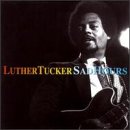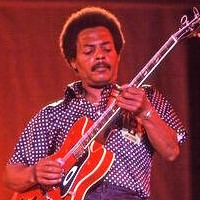Home » Jazz Musicians » Luther Tucker
Luther Tucker
Luther Tucker was a consummate blues guitarist with impeccable credentials. His early apprenticeship was under Big Bill Broonzy and Robert Jr. Lockwood. His recordings as session man at Chess Studios led to his eight year stint with Little Walter. That was just the beginning. Tucker was born in Memphis, Tennessee on January 20, 1936. His father was a carpenter and his mother worked as a boogie pianist and guitarist. The family moved to Chicago when Luther was, seven years old. When Luther was in his early teens, his mother introduced him to the patriarch of Chicago Blues, Big Bill Broonzy. A frequent visitor to Broonzy's home was guitarist, Robert Jr. Lockwood, who took the young Tucker under his wing. Lockwood's lessons paid off for Luther. Barely 15, he accepted a position playing with his renowned uncle, saxophonist J.T. "Big Boy" Brown. Together they worked the circuit of Blues clubs throughout the country. Upon returning to Chicago, Lockwood took Luther to Chess Studios in 1952. Harmonica master, Little Walter, who had recently departed the Muddy Waters Band following the success of his single "Juke", was putting together a new band and decided that he would use two guitarists. Lockwood convinced Walter to hire Tucker despite his youth. In October of that year, he made his debut recording on the song "Blue Midnight." He would continue to work with Walter's band for the next eight years, appearing on such noted songs as "Key To The Highway," "Last Night," "Mellow Down Easy," and "Boom Boom. (Out Go The Lights)" His personal guitar style was already beginning to shine, though the older bluesmen did not want to give up their solos to the youngster. He also contributed to the songwriting, also without much credit. His studio work and touring with Little Walter helped to make Tucker an in-demand session player. Up through the mid-1960s he recorded extensively with many of the genre's top artists. He appeared on well-known numbers such as Muddy Waters' "She's Nineteen Years Old," "Five Long Years," and "Elevate Me Mama." Works with Sonny Boy Williamson II would include "Your Funeral And My Trial," "Fattening Frogs For Snakes," "One Way Out," and "Little Village." Luther's guitar was also featured on recordings by Otis Spann, Jimmy Rogers, and in 1966, the landmark recordings of "Chicago/The Blues/Today! Volume 2" found Tucker paired as second guitarist to West Side master Otis Rush. In the latter half of the 1960s, Luther Tucker joined the James Cotton Blues Band.
Read moreTags
Photos
Music
Recordings: As Leader | As Sideperson















